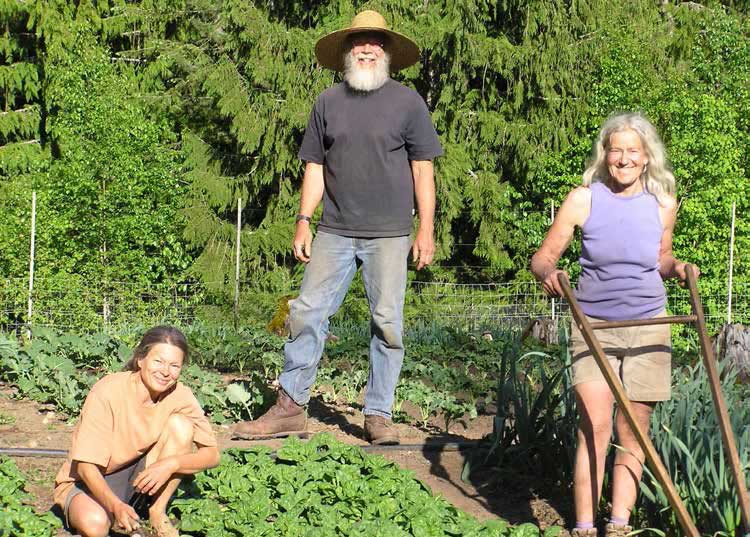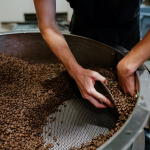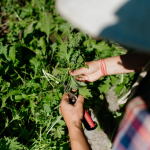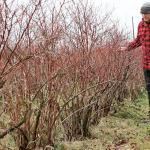Intentional Peasantry at Tipiland Organic Produce

Marjorie Harris
The Way of the Past is Hope for the Future
What a magical adventure it was to visit Tipiland Organic Produce in Argenta, BC!
The ideals of the Aquarian Age generation are manifest in every aspect of Tipiland’s success, demonstrating how the dreams of social interconnectedness, collective action and co-operative systems can become a positive and sustainable reality.
Tipiland celebrated their 25th year of operation in 2014, another milestone in their success story which is rooted in the back-to-nature, counter culture movement of the 1970s. The journey has been a fulfilling one for lifelong gardeners Inanna Judd, Gary Diers, and Sarah Ross. Their collective commitment has been to provide the purest, freshest, most nutrient dense, and beautiful certified organic produce possible from their market garden.
To reach Tipiland I headed to to the northern head of Kootenay Lake and then turned south, driving along the base of Mount Willet’s evergreen covered slopes that rise up out of the steel blue waters of the lake and climb high into the sky to form a brilliant white peak. The gravel road only got me as far as Tipiland’s upper level garlic patch. From there I embarked on a 15-minute hike downhill through an enchanting forest, enjoying the aromatic scents and the springy soil underfoot that creates gentle earth music, like drum beats in your walking. As I lifted my eyes way, way up, 150 feet through the trees to the sky above, I was in awe of such a forest and such a location for this very special organic garden patch. I could sense the meditative pace of daily living here, even during the feverish work of the growing season: the forest calms the soul.
The ideals of the Aquarian Age generation are manifest in every aspect of Tipiland’s success, demonstrating how the dreams of social interconnectedness, collective action and co-operative systems can become a positive and sustainable reality.
In 1989, Tipiland’s founding farmer — the young and brave Sarah Ross, then in her mid-twenties — had a vision to start a market garden. She set about very carefully selecting a 2-acre garden plot near the middle of the 200-acre virgin forest held in common by the members of the Kootenay Co-operative Land Settlement Society. The land co-op was established in Argenta in 1972, emerging out of the back-to-the-land movement and locating itself next door to a Quaker Intentional Community. Both communities shared common goals to live more locally, consume less energy, and make positive changes while having fun.
One of Tipiland’s current farmers Gary Diers, explains how without Kootenay Co-op, Tipiland would simply not be Tipiland: “We have grown together hand-in-hand,” says Gary. “A farm on a land co-op, selling to a food co-op: what a great fit!”
Thus began their long relationship. “Kootenay Co-op clearly lead the way,” remembers Gary. ‘Local’ is natural for the Co-op, it is an organization embedded in the community. The members are the Co-op. So when Sarah approached the Co-op about selling them local organic produce they quite naturally said, “Yes!”
Gary continues, “the management of the Kootenay Co-op didn’t stop there. They decided to make what was then a radical commitment to sell only organic produce. They were listening to their members, and I think that they, like Sarah, sensed the blossoming of the organic movement.”
By the mid 1990’s Inanna and Gary took over operating Tipiland Produce fulltime, finally realizing their dreams of farming. This coincided with the time when Kootenay Co-op was instrumental in getting the Kootenay Organic Growers Society (KOGS) started. Gary recalls how every winter local organic farmers would meet with the produce team of the Kootenay Co-op to decide who would grow what in the following year. “They certainly didn’t enjoy the task of trying to filter out just who was really organic, or who wasn’t — a ridiculous task for a store. So KOGS was born.” Tipiland was one of the founding members of KOGS, which was kind enough to issue them with the certification number #00l, which remains with them to this day.
Gary enthusiastically remembers how Tipiland helped develop the market and has grown with the market. “Every single year Tipiland has sold more vegetables than the year before. We now sell 15 times more produce than when Inanna and I first took over the reins of Tipiland and we still have more capacity.”
When Inanna first suggested growing kale, the Co-op manager was skeptical, since kale had never been seen in local stores before — but was willing to give it a try. The rest is history. Kale is now Tipiland’s second largest crop, with 10 varieties planted this year. They still sell their kale to the Co-op, and to eight other businesses.
Tipiland also has a flourishing business in certified organic flowers. Again, the Kootenay Co-op was their first buyer, and continues to retail their bouquets. Inanna has trialed hundreds of varieties of vegetables and flowers and saves seeds of over a hundred varieties. Gary says with a smile, “ Inanna can run circles around anyone with a wheel hoe!”
In Gary’s estimation, in order for a farm to truly be sustainable it must employ farm workers from its local community. And for farm work to be viewed as an honourable occupation in our society, the workers must receive all the same rights and pay as other workers in Canada. Early every Wednesday and Thursday morning a crew of locals, ranging in age from 18 to 72 years old, from Argenta to the Lardeau Valley, assembles to fill farm orders. Gary proudly notes that Tipiland has not missed one delivery from May to November in all these years.
In Gary’s estimation, in order for a farm to truly be sustainable it must employ farm workers from its local community.
Farming at Tipiland is mostly unmechanized. As Gary says, “We have always enjoyed working with our hands and believe it is not only the way of the past, but the hope for the future. One might call us intentional peasants. The beauty of all this for us at Tipiland is that this model works. With our low capitalization we have never needed to secure a loan. We pay our farm workers above average agricultural wages, providing jobs in our community. The bottom line is definitely working.”
Tipiland uses almost no electricity in its operation. Their home and farm are completely off the grid. They do not need a cooler as all produce is picked, then hydrocooled and delivered to stores within 24 hours. Tipiland is labour intensive, not energy or capital intensive. Everyone walks or bicycles to work.
But as Gary is quick to point out, “We’re not purists. We do have an Italian rototiller and a truck. Our rototiller has a diesel engine and last year we used almost 40 litres of fuel for our entire operation. Our Japanese import delivery truck is also diesel with a 4 cylinder engine and we can deliver almost one and half tons of produce all the way to Nelson and back for about $40 in fuel.”
Gary’s final take home message is a quote from Wendell Berry, “Never farm more than you can garden!
Marjorie Harris, BSc, IOIA V.O., P. Ag. Email: marjorieharris@telus.net
“Let food be thy medicine and medicine be thy food.” – attributed to Hippocrates




